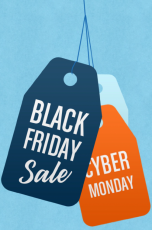Black Friday/Cyber Monday Online Shopping Guide
 Black Friday/Cyber Monday online shopping can be a great way to avoid the hectic crowds, the shoving and long queues during the busiest shopping day of the year. However, it also has its own disadvantages.
Black Friday/Cyber Monday online shopping can be a great way to avoid the hectic crowds, the shoving and long queues during the busiest shopping day of the year. However, it also has its own disadvantages.
Shop.org, a division of The National Retail Federation (NRF) released its 2014 online holiday sales forecast.
Sales are expected to grow between 8 — 11% this year, that's a 4.1% jump from the previous year. What's more interesting is that since more and more shopping is done online, the expected e-commerce growth of holiday sales for 2014 is 105 billion!!!
Whether you choose to shop on Black Friday, Cyber Monday or both always remember to be precautious on the deals and bargains you see online. Be on the lookout for potential scams that may be lurking with bogus websites and fake emails. If you're planning on letting your fingers do the shopping, here are five tips to help you stay safe.
1. Reflect Before You Act
Start off ensuring that you are connected with a secure Wi-Fi connection. Use a secure Wi-Fi connection. If you're on a public Internet connection, you risk exposing your personal information to immoral hackers lurking on the same network.
2. Don't Click E-Mail Links
You may be bombarding with emails offering deals from different retailers that have your email address in their databases. Following links from phony e-mail is one of the oldest methods for perpetrating any online scam. So don't be fooled by messages in your inbox offering enticing sales at known sites and then clicking away only to land on a scam site. Instead, open up your Web browser and enter the URL to the site offering the discounts you're looking for and do a search for the items yourself.
3. Trust Your Instincts
- With many retailers offering deep discounts, sometimes as much as 50 percent, it may be tough to figure out which deals are too good to be true. The best way not to be taken in by a scam is to only shop at sites you know and trust.
- Shop only at well-known stores such as amazon.com, ebay.com or any online stores that you are used to seeing. If you come across with a site such as www. 4pple.com, chances are it is a knock-off and shady website trying to imitate Apple website.
- Should you still wish to purchase online from a smaller company, make sure to get working contact numbers and verify the company's return policy, if any.
- If you're still on a fence and not so sure about a site you've never seen, trust your instincts or go to the Better Business Bureau website (www.bbb.org) to check on the seller’s reputation and record for customer satisfaction.
4. Secure Your Purchase
- The Better Business Bureau advises you to make sure your purchase is secure by only entering credit card details on Web pages that use SSL (Secure Sockets Layer) security.
- To make sure you're on a secure page, check to see that the URL for the page begins with "https://" and not "http://." That "s" lets you know the site is secure. Most browsers will also show a lock icon in the lower right corner of the browser window to let you know you're on a secure site.
- Only pay for online purchases with a credit card as opposed to a wire transfer or other non-plastic payment method. Federal laws permit you to dispute an item on your credit card bill if you do not receive your purchase or an item that you strongly believe you never purchases.
5. Make Sure Your Antivirus Software is Up-To-Date
- As with any guide to online security, make sure that you're operating system and antivirus software are up to date with the latest security patches and other updates. That way if you do end up on a malicious site you have the best protection possible against any attempts to download or execute code on your machine.
- Use a reputable web browser such as the latest versions of Google Chrome, Internet Explorer, Mozilla Firefox, and Safari. These browsers will also offer protection against malicious activity and steer you away from sites known to exhibit nasty behavior.




